You Can't Buy Your Way Into Social Media
I've been taking a look at how big brands try to buy their way in to social spaces online. I'm not talking about ephemeral advertising on the side of the screen, I mean "sponsored posts".
It strikes me that large companies simply don't realise that buying your way into a conversation is an admission of failure. It's like being that kid who no one likes but, hey, we'll play with him because his parents buy him loads of toys. It's not friendship, it's not authentic, it doesn't create anything more than the most transient of relationship.
This is best summed up in this quote from Mike Arauz:
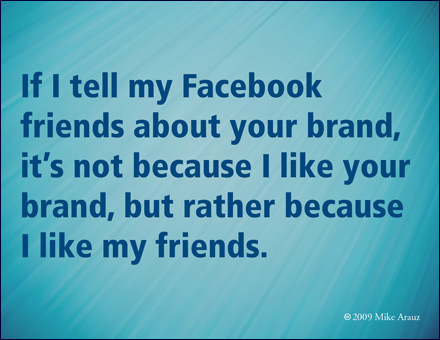
Buying a sponsored post on Facebook or Twitter is the equivalent of winning a prize when you've bribed the judges. Unsurprisingly, people react negatively to it. I've already written about the backlash against TomTom's advertising. In this post, I want to focus less on the argument about whether social media should have advertising, and more on why advertisers need to be worried about how they position themselves and respond to critical content.
Here is the latest Facebook sponsored post from Coca Cola. By most lazy metrics, it's a success - 32 thousand likes and over a thousand comments. What's not to love?

Once we dive in to the comments, and see what people are talking about, we get a very different impression.
At first, we see a mix of banter - praise and disparagement.
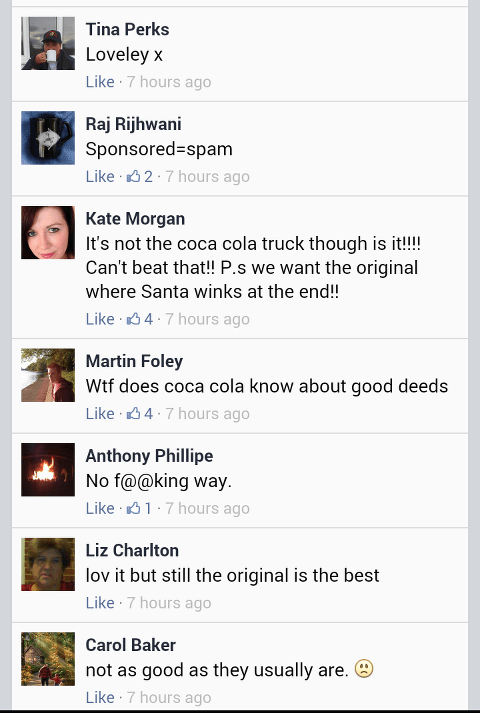
Some people think it's too early for a Christmas campaign and react in a humorous fashion.
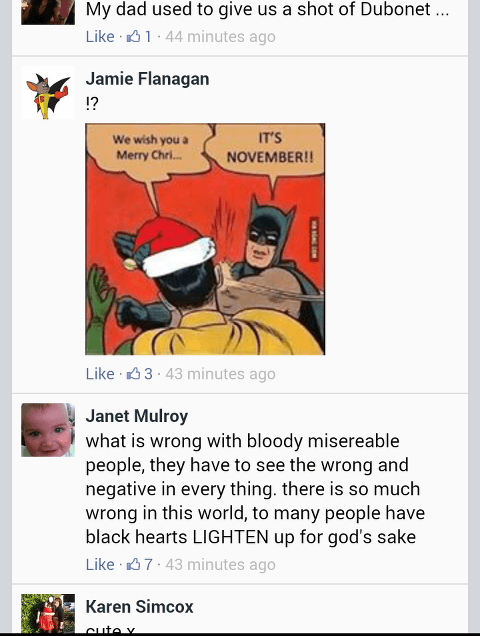
But it turns sinister very quickly.
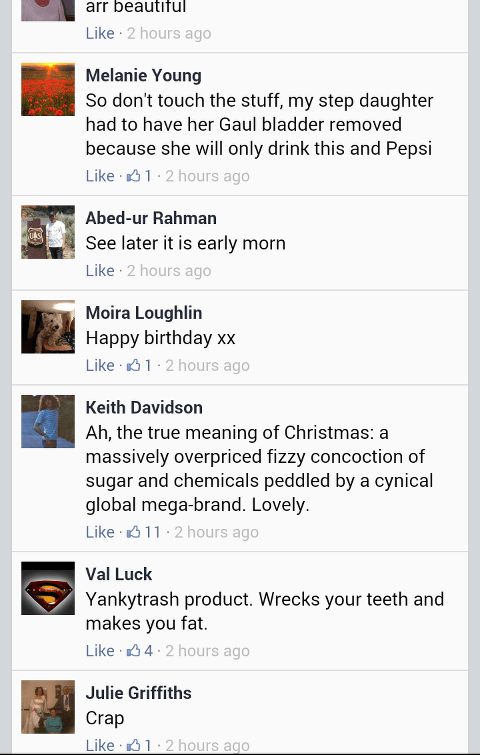
Some users are clearly very upset about the presence of Coke on their wall.

Others want to talk about Coke sponsoring the homophobic Winter Olympics.

Spammers quickly jump aboard. After 7 hours, it's clear no one from Coke is monitoring these posts.
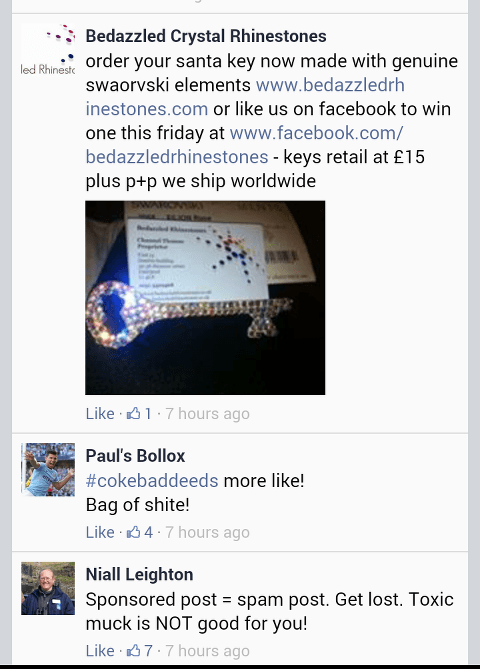
The vitriol begins to grow.
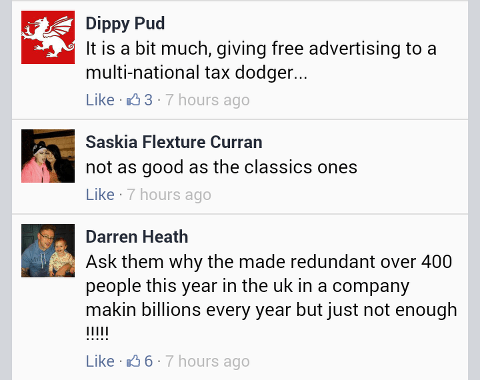
The dirty tricks of Coca Cola begin to be discussed.
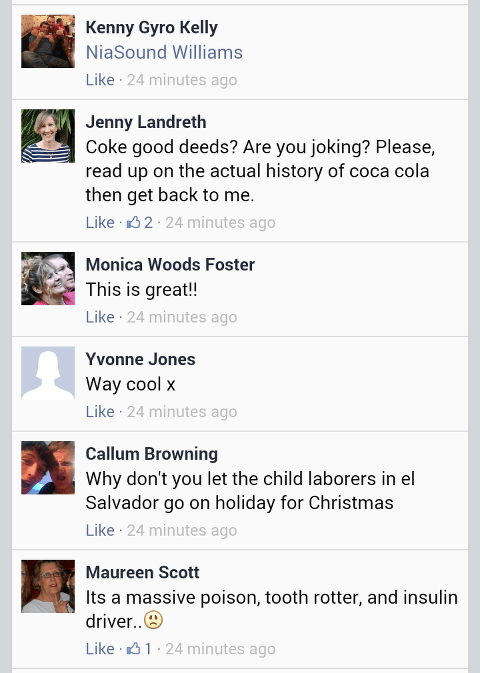
As do the health effects.

The "Good Deeds" theme is quickly exposed as corporate greenwashing.

I haven't even mentioned the posts promoting competitors, the racist language, or the repeated calls for them to stop avoiding tax.
Without realising it, Coca Cola have created that most valuable of things - a Social Object. Essentially, it's the nexus of a social network - a thing that people want to talk about.
...[H]ere we all are gathered here tonight around this Social Object. The network builds itself around it. The money, therefore... is in the object. Not the network. If you build it they will come.
James Whatley on Social Objects
This advert is a fantastic Social Object! They've got people talking about their advert - the only voice missing from the conversation? Theirs!
Yup, they've built a Social Object and completely failed to capitalise on it. They could be talking about the good work they're doing, refuting the health claims, talking seriously about workers rights, sharing insights into why they made this advert rather than use their old one - the list is endless.
Instead, they've chosen the laziest way imaginable. Release an advert, force it into people's social networks, then sit back and relax.
If one of the world's largest companies, employing the best advertisers, working in conjunction with the top social network, can't get this right, we might as well call game over for social advertising.
I understand and accept that a free service is paid for by advertisers. But do the advertisers understand how to use this medium? After all, Facebook has only been open to the public for 7 years - we can't expect advertisers to understand how the medium works - not with the amount of coke they "drink".
If companies can't figure out how to engage with their audience in an authentic manner, they will face a backlash of their own making.
To those who say "if you're not paying for the product, you are the product", I'll let my wife rebut this lazy generalisation:
Facebook might not like this attitude, but they made the decision to design a business which sells rational, self interested agents in the first place. If they didn’t want their "product" to rebel against them they shouldn't have gone into the business of selling something which has a brain.




I'm not sure if I agree with your thesis here. Big brands use their connections, resources, cash to get their brand front and center on social media (& mass media obviously) and essentially buy their way into prominence. Companies use Facebook ads and the types of companies listed at http://www.buyfacebooklikesreviews.com to essentially try and buy their way to popularity. Regarding the #cokegooddeeds hashtag, for every negative comment you'll see attached to that, you'll see about 50 positive ones. Most people are subtly affected by those ads towards brands. These big brands aren't going for marketing where users take some specific action, but they're going for advertising where they saturate the planet with knowledge of their brand. In this context, I think brands do buy their way into social media for all intents and purposes.